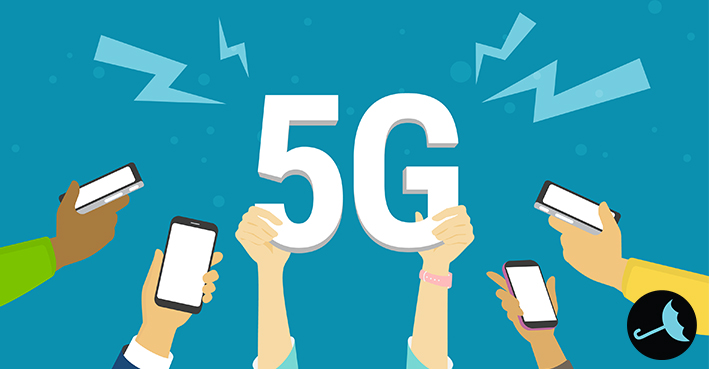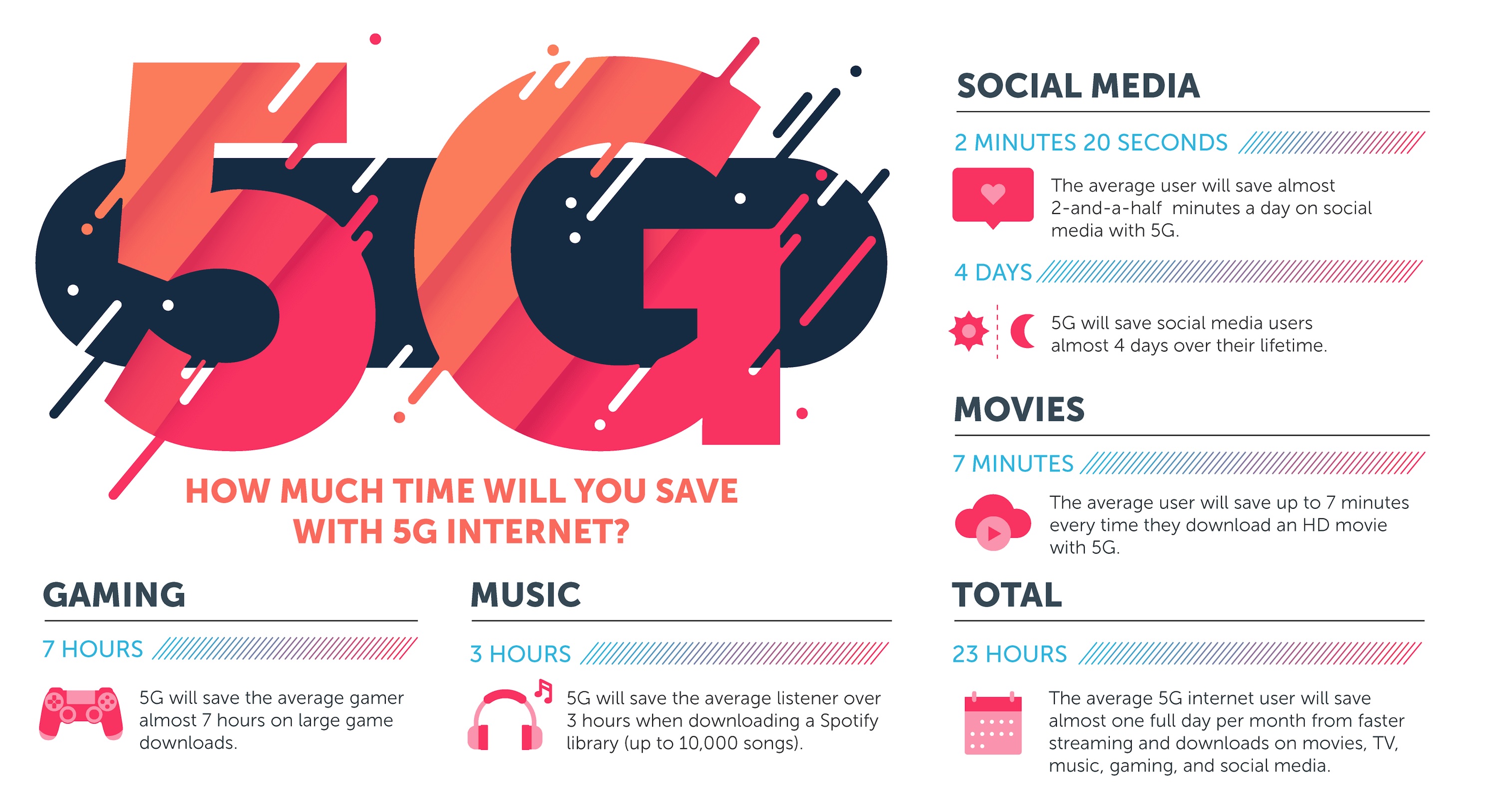How 5G Is Transforming the Internet… and Your Business

You’ve heard of autonomous vehicles, virtual reality, and the Internet of Things (IoT), but have you ever thought about how our current wireless network can handle all of the devices and demand? Well, 4G just won’t do.
Enter 5G, the fifth generation of cellular communications to meet our business and consumer demands. It’s the high-speed wireless network that will succeed 4G in the coming years, just as 4G supplanted 3G.
What Is 5G?
5G is the next generation of mobile communications, designed to be much faster than current 4G LTE technology. In the future, all of your cellular devices will use 5G… that is, until 6G comes along.
In some ways, the jump to 5G is pretty boring. It’s basically just a faster internet connection, similar to the change from 3G to 4G, but it’s the implications that get interesting.
It’s not just speeding up smartphones and wireless internet connections—the 5G network is powerful enough to run a hyper-connected, low-latency world, including self-driving cars, drones, smart homes, virtual reality, city infrastructure, and the Internet of Things (IoT).
Going from 10-40 milliseconds to 1 millisecond latency is the difference between a jumpy experience to a perception of immediacy. This is important for video conversations, smart cars, VR, and other synchronized realities.
At the consumer level, all of your devices and smart products will respond in milliseconds, faster than a blink of the eye. No more glitchy Skype or Facetime videos.
5G Benefits
5G promises superior speeds and reduced latency compared to the 4G network. While actual performances vary based on many factors, you can expect:
- Superfast internet speeds (10-20x faster than 4G)
- More reliability (10x less outages)
- Reduced latency (as low as 1 millisecond compared with around 40 millisecond with 4G)
The faster connection and low latency is almost instantaneous with 5G technology. This opens up a whole new world of “smart” applications.
How Does 5G Work?
Although it was created years ago, it’s estimated that even by 2025, 5G will lag behind both 4g and 3g in terms of global connections (GSMA Intelligence).
While 3g and 4g were fairly easy to roll out since they were able to use existing frequencies on the country’s radio spectrum, for 5G to work, it needs to use a frequency with a much bigger bandwidth, requiring brand new infrastructure.
The cell towers that 4G uses are designed to reach a broad area, about 70 kilometers. 5G is can transmit data at much higher speeds, but its coverage is only 300 meters or so. That means many more nodes need to be installed. There will need to be thousands of 5G network nodes to cover just a small area, a complex and costly undertaking.
While the hardware may be expensive to install, the software is written in a way to save money and energy.
You’ll start noticing 5G start popping up in a lot of cities this year (if you haven’t already), but it will take a while before 5G reaches the suburbs and rural areas. When 5G does get established, the wireless network will replace the current system of phone lines and cables.
How Fast is 5G?
At its theoretical maximum, 5G is 100 times faster than 4G. That’s when you compare the maximum download speed of 100 megabits per second (Mbps) for 4G with 5G’s 10 gigabits per second (Gbps).
In reality, however, 5G is more like 10-20x faster than 4G. That’s because in most cases you’ll plateau around 50 Mbps for 4G and less than 900 Mbps for 5G.
On Verizon’s 5G FAQ page, they claim their 5G internet is up to 20x faster than 4G LTE speeds. You should expect internet speeds of around 300-900 Mbps.
This speed increase is similar to the jump from 3G to 4G. If you remember, 4G took us from around 5-12 Mbps to speeds approaching 50 Mbps.
Still, the faster speeds and lower latency are significant. To give you a sense of the speeds we’re talking about, 4G can download a 2-hour movie in about 7 minutes. 5G can download the same movie in under 6 seconds (PC Mag).
How much time will you save with 5G internet?

Source: highspeedinternet.com
When can we start using 5G?
Currently, 5G is still under development but it’s already moved into early commercialization. Verizon just launched their 5G Home internet service in the fall. Right now, it’s only available to limited areas of Sacramento, Los Angeles, Houston, and Indianapolis.
AT&T (currently taking heat for updating phones with fake 5G icon) and Sprint (together with T-Mobile) aren’t far behind. Meanwhile, Samsung just finished showing off their 5G smartphone prototype at CES 2019 in Las Vegas. They will be releasing the first 5G smartphones in the first half of 2019.
We’ll hear more about 5G as governments and corporations make progress building the infrastructure necessary to power the network. 2019 will be a big year for 5G installation and deployment.
5G Implications for Your Business
The advancement of cellular technology like 5G will only accelerate the transition to a more connected and automated world. Smart homes are already a thing, but they require faster connections and less lag time.
Smart appliances like HVAC systems and water heaters are already on the market. Many of them have environmental sensors that alert the owner to upcoming maintenance and repair needs. What’s stopping appliances from automatically connecting to platforms and smart speakers, such as Google, Facebook, Windows, and Amazon? Absolutely nothing.
There’s a huge potential for companies like Google, Facebook, Amazon, Angie’s List, Home Depot, HomeAdvisor and others to partner with manufacturers of smart products (or manufacture the products themselves) and connect their platform (Google Local Service Ads, Amazon Home Services, etc.). You could be cut out.
There are already HVAC systems and other appliances that can connect to smart speakers and alert the owner to the need for maintenance or repair. 5G is speeding up the technological shift to a “smart,” software-defined world. This opens up a whole new sales channel if the machines themselves are now connected to the internet.
5G is the technology that will accelerate our hyper-connected world, including self-driving cars, drones, VR, smart homes, and even entire cities. Get ready.
Learn More about 5G and Other Market Disruptors for the Home Service Industry
Get ahead of your competitors by looking ahead! Learn about current and future market disruptors that could hurt your company if you’re not careful – or improve your company if you’re riding the wave.
In VitalStorm’s eBook, 5 Market Disruptors for the Home Service Industry (and How to Use Them to Your Advantage), you’ll learn how to navigate disruptions in the home service industry including the Amazon Home Services, Voice Search and other recent innovations.
Schedule your FREE website, PPC, SEO, call center training, and general online marketing consultation by calling the number below.
1-877-311-5695
VitalStorm stays on top of all the latest digital marketing news so you don’t have to. Follow us on Facebook, Twitter, and Google+.

